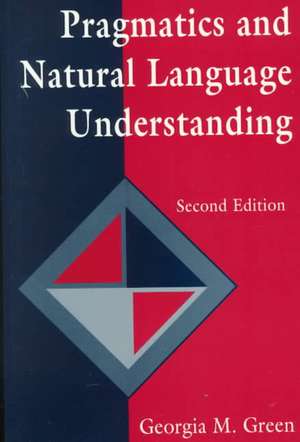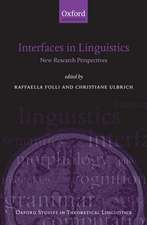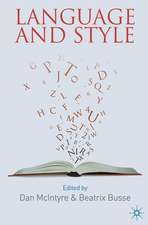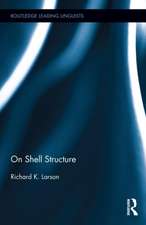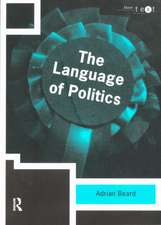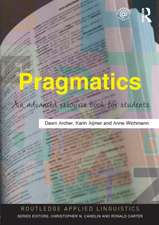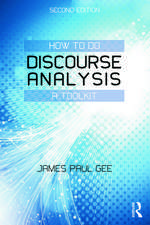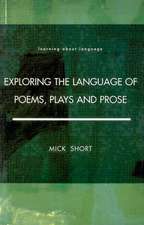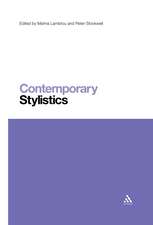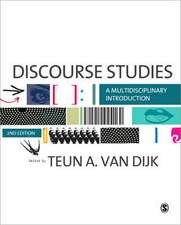Pragmatics and Natural Language Understanding: Tutorial Essays in Cognitive Science Series
Autor Georgia M. Greenen Limba Engleză Paperback – aug 1996
Based on feedback from readers over the past seven years, explanations in every chapter have been improved and updated in this thoroughly revised version of the original text published in 1989. The most extensive revisions concern the relevance of technical notions of mutual and normal belief, and the futility of using the notion 'null context' to describe meaning. In addition, the discussion of implicature now includes an extended explication of "Grice's Cooperative Principle" which attempts to put it in the context of his theory of meaning and rationality, and to preclude misinterpretations which it has suffered over the past 20 years. The revised chapter exploits the notion of normal belief to improve the account of conversational implicature.
| Toate formatele și edițiile | Preț | Express |
|---|---|---|
| Paperback (1) | 350.68 lei 6-8 săpt. | |
| Taylor & Francis – aug 1996 | 350.68 lei 6-8 săpt. | |
| Hardback (1) | 1002.02 lei 6-8 săpt. | |
| Taylor & Francis – aug 1996 | 1002.02 lei 6-8 săpt. |
Preț: 350.68 lei
Nou
Puncte Express: 526
Preț estimativ în valută:
67.10€ • 70.06$ • 55.54£
67.10€ • 70.06$ • 55.54£
Carte tipărită la comandă
Livrare economică 04-18 aprilie
Preluare comenzi: 021 569.72.76
Specificații
ISBN-13: 9780805821666
ISBN-10: 080582166X
Pagini: 200
Dimensiuni: 152 x 229 x 12 mm
Greutate: 0.32 kg
Ediția:Revised
Editura: Taylor & Francis
Colecția Routledge
Seria Tutorial Essays in Cognitive Science Series
Locul publicării:Oxford, United Kingdom
ISBN-10: 080582166X
Pagini: 200
Dimensiuni: 152 x 229 x 12 mm
Greutate: 0.32 kg
Ediția:Revised
Editura: Taylor & Francis
Colecția Routledge
Seria Tutorial Essays in Cognitive Science Series
Locul publicării:Oxford, United Kingdom
Public țintă
ProfessionalCuprins
Contents: What Is Pragmatics, and Why Do I Need to Know, Anyway? Indexicals and Anaphora: Contextually Identifiable Indeterminacies of Reference. Reference and Indeterminacy of Sense. Non-Truth-Conditional Meaning: Interpreting the Packaging of Propositional Content. Implicature. Pragmatics and Syntax. Conversational Interaction. Perspective.
Recenzii
"...a succinct and thorough review of the major issues in the study of pragmatics...would serve well as the main text for an introductory course or seminar on pragmatics....also useful for second language teachers and researchers interested in this related field who wish to have a good resource book."
—Modern Language Journal
"...provides a strong foundation of work on pragmatics that will give cognitive scientists a solid understanding of the important basic problems of natural language understanding that have previously been dealt with by philosophers and linguists....filled with interesting phenomena that deserve further psychological investigation."
—American Journal of Psychology
"I heartily recommend P&NLU as a well-written, concise introduction to modern linguistic pragmatics. As an undergraduate textbook, it is ideal."
—Language
Praise for the first edition:
"...certainly fills a need in a growing market of interdisciplinary audiences needing a basic understanding of natural language semantics and principles of information communication....may be very effective in triggering their interest and motivating further study in the field."
—Alice G.B. ter Meulen
Indiana University, Bloomington
"I am happy to say that I liked it much better than pragmatics texts I had used in the past, and that my course was more successful overall than it had been before. The students found it clearly written and (relatively) easy to understand. The examples are especially clear. In general, then, it is excellent, and I intend to use it for the same course this coming year."
—Jeanette S. DeCarrico
Portland State University
—Modern Language Journal
"...provides a strong foundation of work on pragmatics that will give cognitive scientists a solid understanding of the important basic problems of natural language understanding that have previously been dealt with by philosophers and linguists....filled with interesting phenomena that deserve further psychological investigation."
—American Journal of Psychology
"I heartily recommend P&NLU as a well-written, concise introduction to modern linguistic pragmatics. As an undergraduate textbook, it is ideal."
—Language
Praise for the first edition:
"...certainly fills a need in a growing market of interdisciplinary audiences needing a basic understanding of natural language semantics and principles of information communication....may be very effective in triggering their interest and motivating further study in the field."
—Alice G.B. ter Meulen
Indiana University, Bloomington
"I am happy to say that I liked it much better than pragmatics texts I had used in the past, and that my course was more successful overall than it had been before. The students found it clearly written and (relatively) easy to understand. The examples are especially clear. In general, then, it is excellent, and I intend to use it for the same course this coming year."
—Jeanette S. DeCarrico
Portland State University
